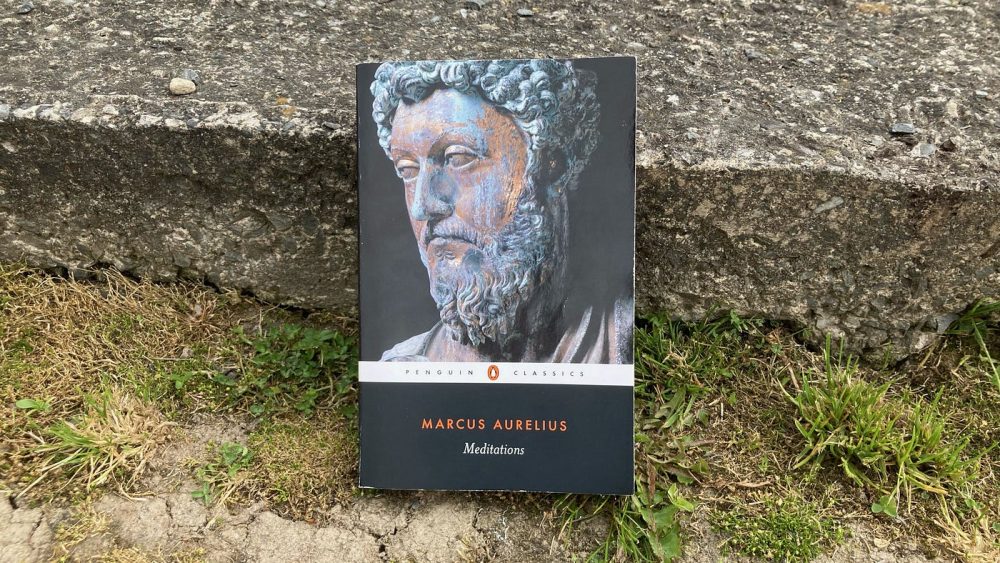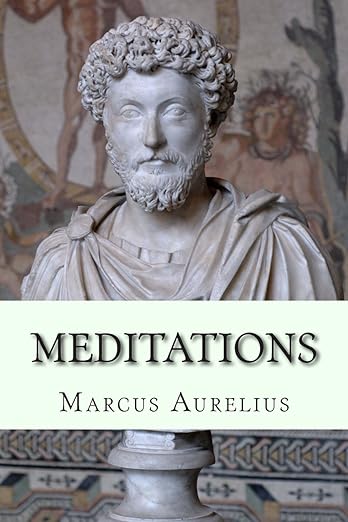If you’ve ever encountered the idea of Stoicism, Marcus Aurelius is a name you might know about. One of the forefront thought leaders in the space, his teachings are central to the Philosophy and his book “Meditations,” one of the most foundational materials. In this Marcus Aurelius Meditations Summary, I share some key insights and themes that you can learn from.
This article may contain affiliate links. This helps me continue providing valuable learning content sustainably for readers. Feel free to use the link, or not. In any case, thank you for checking out my blog!
Who Was Marcus Aurelius?

Marcus Aurelius was a Roman Emperor from 161 to 180 AD, renowned for his philosophical writings and as a significant figure in the Stoic tradition. Born on April 26, 121 AD, in Rome, Aurelius was adopted by Emperor Antoninus Pius and succeeded him, marking the last of the rulers traditionally known as the Five Good Emperors.
Aurelius is often remembered not only for his role as an emperor but also for his philosophical temperament. His reign was marked by military conflict, including wars with various Germanic tribes and the Parthian Empire, as well as dealing with the plague that devastated the Roman population. Despite these challenges, Aurelius remained deeply committed to the principles of Stoicism, which guided both his conduct and his governance.
How Marcus’ Aurelius’ Meditations Came to Be
His philosophical work, Meditations, though not intended for publication, consists of a series of personal reflections and exercises in Stoic philosophy. Written during his military campaigns, these writings emphasize virtue, reason, and the transient nature of human existence, offering guidance on how to navigate life’s challenges with grace and perseverance.
Marcus Aurelius died on March 17, 180 AD, in Vindobona (modern Vienna) or Sirmium in Pannonia. He left behind a legacy that has endured as a symbol of the philosopher-king ideal. To me, his life someone shows how one might attempt to balance the responsibilities of leadership with a commitment to personal ethical and philosophical ideals.
Marcus Aurelius Meditations Summary: What’s It About?

Meditations by Marcus Aurelius is a series of personal writings by the Roman Emperor. These letters came about while he was on military campaigns between 170 and 180 AD. The work (not sure if you can call it a book per se) is a cornerstone of Stoic philosophy and provides a clear insight into the mind of an ancient leader who was incredibly powerful yet philosophically introspective.
The book is divided into 12 books (or sections). Each one of these sections contains Aurelius’ thoughts on how to live according to the philosophy of Stoicism, which emphasizes logic, self-discipline, and fortitude as a means to overcome destructive emotions.
Meditations is not intended as a systematic philosophy, but rather as a personal diary that Marcus Aurelius never intended for publication. The entries are diverse, ranging from his notes to himself on how to remain calm, merciful, and effective in the face of conflict, to his views on the natural world and his place within it.
The core themes of Meditations include the transient nature of the universe and the importance of aligning oneself with nature and the universal order. Marcus Aurelius stresses the temporary nature of human concerns and the wisdom of focusing on one’s conduct and attitude amidst uncontrollable external events. It is a profound reflection on how to live virtuously and maintain inner peace, even in challenging times.
7 Major Themes in Meditations
What can we learn from Meditations? Here are seven major themes and life lessons from Marcus Aurelius’ Meditations that reflect the essence of his Stoic philosophy.
1) Impermanence and Acceptance
One of the most prominent themes in Meditations is the power and reality that is impermanence. Marcus Aurelius frequently reflected on the transient nature of life and the universe.
What stood out to me most when reflecting on these teachings was the importance of accepting this impermanence. We must learn to not becomeoverly attached to things that are inherently temporary.
2) Rationality and Control
Anoter central theme in Stoicism and in Meditations is the focus on rationality— something that humans struggle with immensely. It’s ironic how even as the only creatures to walk this earth to have the ability to reason, we often think and behave irrationaly. We live in greed and fear, allow our impulses to decide how we govern relationships and spend our money, let our basic primal instinct kick in when stressed out.
Through all this, Aurelius advocates that we learn to control reactions to external events and maintain a rational mind. These things, he believes will help us live a peaceful life. We cannot control what happens to us, but we can control how we respond.
3) Duty and Responsibility
As an emperor, Marcus Aurelius was deeply concerned with duty and responsibility, as he should be. In some way or another, we’re “emperors” of our own empires— our businesses, households, communities, departments, and so on.
Marcus writes about the importance of fulfilling one’s role in society and adhering to one’s duties with integrity and honor. Undoubtedly, personal hardship will get in the way of that, but the greatest calling is to remain steadfast in our duty even in our trials.
4) The Unity of Mankind
Aurelius often discusses in his book and other works the idea that all humans are part of a greater whole. That said, we need to make sure that our actions should contribute to the common good. He stresses the importance of cooperation and understanding among people in order to do that.
5) Self-Reflection
Meditations is a work of self-reflection in its own regard. Aurelius examines his own thoughts and behaviors critically. It’s a perfect example of this theme he carries in the book. The emperor emphasizes the importance of self-awareness and constant monitoring of one’s mind and actions to live virtuously.
6) Nature and the Cosmos
Another recurring theme is the importance of living in harmony with nature and the universe. He believed that understanding the natural order and aligning oneself with it generally leads to a virtuous and content life.
7) Death and Mortality
Reflecting on death is a key element in Aurelius’ writings. He uses the inevitability of death as a motivating factor to live a meaningful life and not waste time on trivialities.
After dealing with an existential crisis and struggling with my life’s calling a few months back, this theme was truly eye-opening for me. The stoic approach is what encouraged me to face mortality with dignity and calm. It’s going to happen no matter what we do (prove me wrong Bryan Johnson). So, might as we optimize our life here on earth by living with death and mortality in mind.
3 Key Ideas from Marcus Aurelius’ Meditations
Many lessons and insights jump out of Marcus Aurelius’ Meditations, that’s for sure. But let me share three key ideas that encapsulate some of the central aspects of his Stoic philosophy:
- Virtue as the Sole Good — Marcus Aurelius stresses that virtue (living in reason and excellence in fulfilling one’s nature) is the ultimate good. He believes that external events are morally neutral and that true good lies in how one responds to life’s circumstances. For Aurelius, the pursuit of virtue should be one’s primary focus and guidance for all actions and thoughts.
- The Power of Perspective — Aurelius often discusses the idea that our perception of events, rather than the events themselves, determines our response and emotional state. He advocates for maintaining a perspective that sees challenges as opportunities for growth and as tests of one’s character. By changing our perceptions, we can maintain tranquility and resilience in the face of adversity.
- Acceptance of Fate — Aurelius embraces the Stoic concept of amor fati, or “love of fate”. This idea involves accepting and even embracing whatever happens to us, including suffering and loss, as part of the natural order of the universe. He argues that since these things are beyond our control, we should approach them with acceptance rather than resistance. This acceptance is not passive resignation but an active engagement in life with a serene and composed mind.
Final Thoughts
When people ask me if I’m a Stoic, I don’t always have a straight answer. There are definitely themes that have influenced my way of living immensely, most of them already mentioned above. At the end of the day, it’s not so much the labels that determine who we are. What matters is how we live out the principles.
Looking for more book summaries? Check these ones out next:





